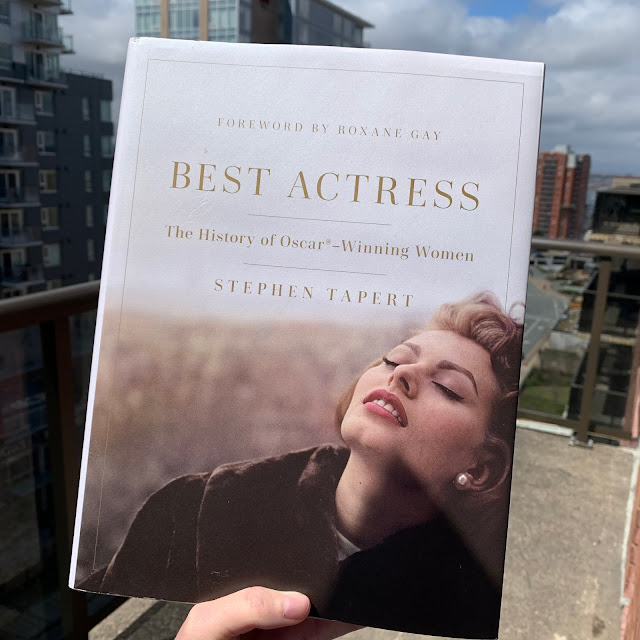Best Actresses: The History of Oscar-Winning Women by Stephen Tapert
And now for a pretty timely review, especially since Frances McDormand made history last night earning her third Best Actress Oscar and first for producing Best Picture!
We find out what they went through on Oscar night. I didn't know that Natalie Portman, who won in 2010 for Black Swan, was apparently caught on a backstage camera chugging a bottle of water next to a sign that said "You're being filmed."
This coffee table book, thoroughly researched and incisively written by Stephen Tapert, traces the history of all the women who have won the Best Actress Oscar: from Mary Pickford through to Emma Stone, who won in 2016 for La La Land.
Each actress has her own entry that details her win by stepping back to discover how she got to the Oscar stage (or bed, in Joan Crawford's case). Early lives, career beginnings, nepotism (in Jane Fonda's and Sissy Spacek's cases, for example), and luck led every woman to her Oscar win.
I have to say, after reading every entry and soaking in all the information, the one actress I need to read the memoirs of is Jessica Lange. What a life! She travelled across the country in a mini-van with her then-husband, then moved to Paris and studied mime, became a dancer and a model, and then came to New York to study acting, and was eventually discovered and given the role of damsel-in-distress in the remake of King Kong.
From there: Bob Fosse, an Oscar win in the Best Supporting Actress category (Tootsie), a sustained career and another Oscar win in the '90s. And she's still going! Write your memoirs, Jessica!
But back to the book overall: We learn how they prepared for their roles: like how Charlize Theron studied every piece of videotape and every article she could find on Aileen Wuornos to transform herself into the serial killer; or how Holly Hunter developed her own form of sign language to give her mute character in The Piano a form of communication.
In some cases, we learn how, overnight, an actress became a sensation (à la Audrey Hepburn). In other cases, we find out how the actresses built up their careers until Oscar finally came knocking (à la Geraldine Page, Shirley MacLaine, Jessica Tandy, or Sandra Bullock).
And Joan Crawford crafted perhaps the most...interesting way to accept an Oscar: she didn't show up to the ceremony and instead held a photo call at her bedside (where she was 'sick' in bed) with her Oscar clutched in her hands.
Interestingly enough, there's no mention in Anne Bancroft's entry that Joan accepted on her behalf and the backstory there (she'd been snubbed for Whatever Happened to Baby Jane? and her co-star, Bette Davis, earned her tenth nomination for the film. When the nominations were announced, Joan called all the other nominees and offered to accept on their behalf if they couldn't attend. Anne couldn't, Joan waltzed on stage, and the rest is gossip history).
I also enjoyed how circular and cyclical the Best Actress category has been over the past 93 years. If an actress wins for playing, say, a historical figure, Tapert will list every time another Best Actress winner has also played a historical figure. If one attended a specific drama school, he'll list all the other winners who were also students there.
I also loved how he humanized every winner: we find out how they used their celebrity to help other, like Jane Fonda using her entire career to be an activist; Elizabeth Taylor pioneering AIDS research and awareness; Audrey Hepburn's link to UNICEF; Sissy Spacek, I believe, used her clout, alongside others, to raise concerns for farmers; and the list goes on.
And, of course, there's all the love in the world for Meryl Streep (as there should be). When Tapert isn't talking about her craft and her record nominations, he's quoting her in other entries to show just how on the pulse Meryl has been since the beginning of her career as it pertains to the roles offered to actresses and how the pursuit of the ideal box office demographic has been to the detriment of women's pictures (which reigned supreme in the early days of Hollywood).
If you're looking for an alternate look at Oscar history, I can't recommend this book enough. I know I'll be buying updated editions as more actresses win.








Comments
Post a Comment